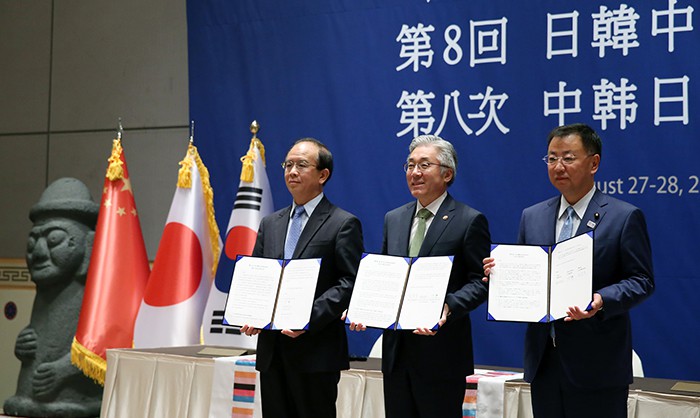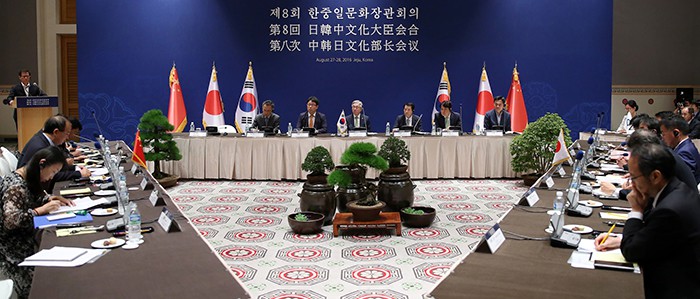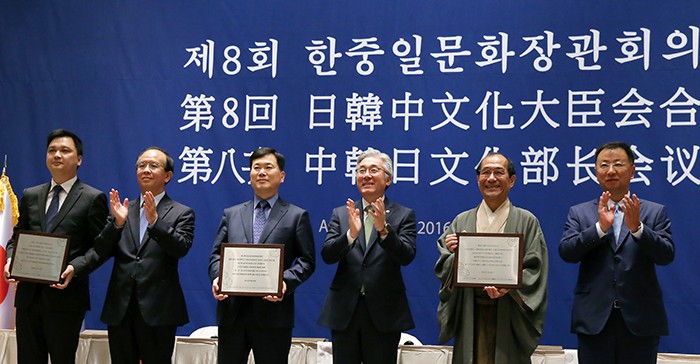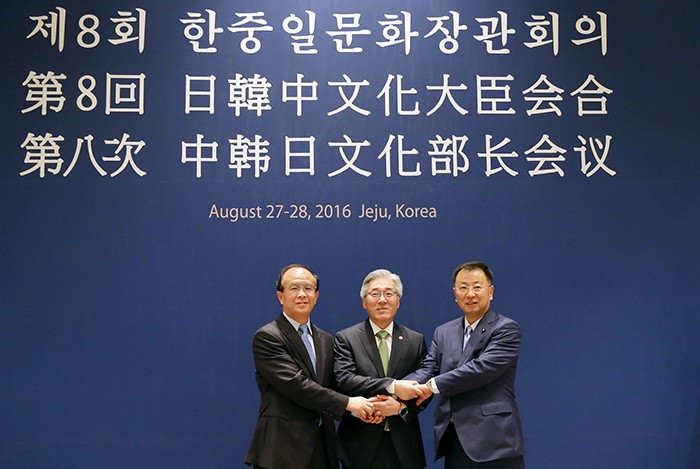
Chinese Vice Minister of Culture Ding Wei (left), Minister of Culture, Sports and Tourism Kim Jongdeok (center) and Japanese Minister of Education, Culture, Sports, Science and Technology Matsuno Hirokazu present the ‘2016 Jeju Declaration’ at the eighth Korea-China-Japan Culture Ministers’ Meeting on Aug. 28 on Jeju Island.
Korea, China and Japan joined hands to expand their collaboration in the arts, sports and other cultural activities.
Minister of Culture, Sports and Tourism Kim Jongdeok, Chinese Vice Minister of Culture Ding Wei and Japanese Minister of Education, Culture, Sports, Science and Technology Matsuno Hirokazu signed the “2016 Jeju Declaration” on Aug. 28 at the eighth Korea-China-Japan Culture Ministers’ Meeting held on Jeju Island.
The Jeju Declaration’s goals are the following: to boost cultural solidarity between Korea, China and Japan in order to expand trilateral cooperation on the arts; to strengthen action plans that support the cultivation of the arts and culture; to form a systemized, collaborative network for the East Asian region; to promote cultural projects that increase human resource exchanges; to boost mutual cooperation on incorporating the arts and culture into the Olympic Games; and, to expand cooperation on the protection and promotion of cultural heritage.
The declaration places an importance on cultural diversity, and sees the long-standing tradition of cultural exchange between the three countries as a template that can be built on through active collaboration.
Accordingly, the leaders agreed to cooperate closely during international events like the upcoming Olympic Games, which the three countries will host consecutively in 2018, 2020 and 2022. The countries shared the opinion that they should put forth a message of peace and unity during the games, and agreed to work together to spotlight East Asian values on the international sporting stage.
The countries also saw eye-to-eye on the need to cultivate young professionals in the arts and culture sectors. A clause for the promotion of joint projects that increase exchanges in the cultural contents sector, like the Korea-China-Japan student animation project, was added to provide vocational training and to create jobs for young artists.

Minister of Culture, Sports and Tourism Kim Jongdeok, Chinese Vice Minister of Culture Ding Wei and Japanese Minister of Education, Culture, Sports, Science and Technology Matsuno Hirokazu attend the eighth Korea-China-Japan Culture Ministers’ Meeting on Aug. 28 on Jeju Island.
During the meeting, the ministers also discussed plans for the Korea-China-Japan Cultural Olympics, a series of events that will coincide with the PyeongChang 2018 Olympic Winter Games, the Tokyo 2020 Olympic Games and the Beijing 2022 Olympic Winter Games. These events will migrate from city to city with the Olympics, and include exhibits that feature collaborative works by Korean, Chinese and Japanese artists, academic symposiums about East Asia, and other events organized by cultural envoys dispatched from each country. The leaders agreed to finalize these plans at the ninth Korea-China-Japan Culture Ministers’ Meeting, held in Japan next year.

Chinese Vice Minister of Culture Ding Wei (second from left), Minister of Culture, Sports and Tourism Kim Jongdeok (fourth from left), Japanese Minister of Education, Culture, Sports, Science and Technology Matsuno Hirokazu (far right) and other dignitaries applaud after announcing the three Culture Cities of East Asia for 2017: Daegu in Gyeongsangbuk-do Province, Japan’s Kyoto in Kyoto Prefecture and China’s Changsha in Hunan Province.
After the meeting, the leaders announced the three Culture Cities of East Asia for 2017: Daegu in Gyeongsangbuk-do Province, Japan’s Kyoto in Kyoto Prefecture and China’s Changsha in Hunan Province. Since 2014, the committee selects a city from each of the three countries every year as a way to increase trilateral cultural exchanges.
“Based on the working plans outlined in the 2016 Jeju Declaration, our three countries wish to open a new chapter of cultural exchanges between Korea, China and Japan,” said Minister Kim Jongdeok at the closing ceremony. “The cultural ministers present at this year’s meeting shared the opinion that the power of arts and culture will be our breakthrough. The meeting was significant in that it provided a forum for the three countries to begin to lay down the groundwork for a shared future.”
By Lee Hana
Korea.net Staff Writer
Photos: Jeon Han, Korea.net Photographer
hlee10@korea.kr

Chinese Vice Minister of Culture Ding Wei (left), Minister of Culture, Sports and Tourism Kim Jongdeok (center) and Japanese Minister of Education, Culture, Sports, Science and Technology Matsuno Hirokazu join hands in solidarity at the eighth Korea-China-Japan Culture Ministers’ Meeting on Aug. 27 and 28 on Jeju Island.























